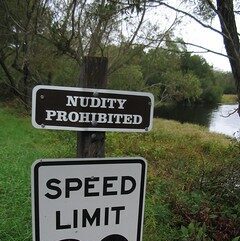Religious atheism can be seen as an attempt to fix religion’s flaws and eliminate its untenable assertions. Most of those flaws revolve around the concept of a spiritual world separate and remote from the physical world of bodies we inhabit here on earth. Out of this mistake spring Gods and miracles and afterlife.
I can paint the religious revolution I am proposing in a few broad strokes.
Religion is not a spirituality-based enterprise, but a body-based one. Its proper object of worship is here and now, for what is bodily is inherently sacred, mysterious and—as we experience it—eternal.*
In order to understand this new religious orientation, it’s necessary to abandon the dichotomy of soul/body and replace it with a new dichotomy: experiencing/behaving. Importantly, it is necessary to declare both worthy of worship. If we do so, it follows that the sacred is right at hand, not separated from us by the chasm of death or lost in the distance of some kind of spiritual realm.
Such realm is at best an illusion of thought, the result of incorrectly drawing the categories of our existence.
By using the dichotomy of experiencing/behavior instead of mind/body, we get a clearer picture of our nature. Experiencing is easily understood as something bodily, created by the brain, and this makes our mind comprehensible as a bodily phenomenon. If a word like “spiritual” refers to something beyond or transcending the body, it becomes an unnecessary fiction. We can now see it as a fundamental misunderstanding of our existence. Pertinently, it follows that religion needs to be body-based, not hinged on the fiction of spiritual entities.
We must never forget that to refer to a beyond devalues life and ruins religion. How much better a religion real and palpable, than a fiction in the stars.
Even heaven is a stillborn vision. A “paradise” without sex or food or body is more akin to death than to life. To be worth anything, life must be bodily. The alive body is the annunciator of our existence.
Now as we all know, the objection to bringing religion down to the body, to imagining life bodily, is that we die. Our bodies die.
We don’t want to die. So we invent afterlife, we imagine heaven or summerland or nirvana and populate it with bodiless souls. Bodiless us, as if that were somehow possible.
By reformulating ourselves as something bodiless, essentially lifeless, we think we can avoid death. Define ourselves as something devoid of life and presto! we are death-proof.
So we think. But it is nothing but the worship of death by another name. The denial of life. The embrace of anti-life, which is the one evil there is.
In embracing death, afterlife, nirvana, heaven, bodiless souls—the religions of the world have betrayed all of us, betrayed the life that we are. They have turned the bow of our human ship toward nonexistence.
They have the gall to call those of us who don’t go along non-believers. When it comes to worshipping what is after life, we are indeed heretics. But their non-belief is aimed at life. Their non-belief is aimed at sex and food and pleasure and everything that is precious and wonderful and worthy of real worship. It is aimed at us.
———
* Since our experiencing of the world began with birth and will end at death, it follows that we have never experienced a time before being alive and will never experience a time after we die. Put another way, we will never know our own non-existence. Others will experience our death, but we will not. Nor does experiencing take place in fixed time, in seconds, minutes, days or years; it occurs in subjective time, moments of indeterminate and varying lengths. Fifteen minutes on the clock may “feel” like an hour; or a clock-hour may seem to whisk by in a flash. In short, our experiences occur in the unexplainable now, and are the essence of what we are; we know nothing but what we experience.
In a valid sense then our experiencing self is us, and it is therefore a remarkable observation that just as we never experienced the beginning of our experiencing, so we will never experience its ending. You can’t experience the cessation of experiencing. Therefore life as we experience it will be eternal. This is surely the source of that iridescent feeling we all have that life goes on forever. It is not untrue. But it is also true that we will die and death is final.



